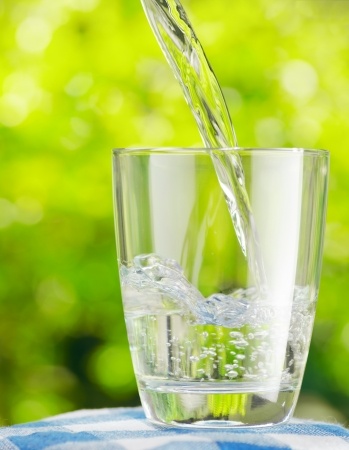Water intake myths abound. This article from Tufts University, Health & Nutrition Letter busts the hydration myths. Adequate water intake in an important facet of maintaining a healthy body. But, many of the things we’ve been told about hydration for a long time turn out to be incorrect.
Water Intake Myths
Adequate water intake is essential to health, so make sure you know the facts. Our bodies cannot function without adequate water. Know the facts to ensure you stay properly hydrated.
Water is involved in many critical bodily functions, from maintaining blood pressure and transporting nutrients to lubricating joints, digesting foods, removing waste from the body, and regulating body temperature. “The human body loses fluids through sweating and urination, and, if sick, also potentially through vomiting, diarrhea, or blood loss,” says Roger A. Fielding, PhD, director of the Nutrition, Exercise Physiology, and Sarcopenia Laboratory and a professor at the Friedman School of Nutrition Science and Policy. Diuretics (medications that increase urine output) can also play a role. “If we lose significantly more fluids than we take in, the result is dehydration,” says Fielding. Chronic dehydration can contribute to fatigue, low blood pressure, constipation, urinary tract infections, and kidney stones, as well as reduced mental activity and physical coordination. Dehydration can also place stress on the cardiovascular system, and emerging evidence suggests it may increase the risk of damage from inflammation, which in turn elevates risk for chronic disease. Let’s take a look at some common myths and misconceptions regarding staying hydrated.
Myth #1: Everyone should drink eight 8-ounce cups of water every day.
Although this is not a bad rule of thumb, it’s not strictly true. How much fluid a given individual needs depends on a number of factors including body size, physical activity level, ambient temperature, humidity, and even the altitude. If you are sweating on a hot day, for example, you will need more water than if you are watching TV in an air-conditioned room.
According to the National Academy of Science, 15.5 cups of water intake for most men and 11.5 cups for most women per day is adequate (more for women who are pregnant or lactating). This is much higher than the eight 8-ounce cup baseline, but foods (such as fruits, vegetables, soup, and even fish, eggs, meat, and cooked grains) supply a significant part of our needs. Beverages like coffee, tea, and milk are composed mostly of water.
Myth-busting advice: Individual needs are more important than numbers. Set a baseline, but, drink more when you’re thirsty, when it’s hot, or during exercise.
Myth #2: It doesn’t matter what I drink, as long as I stay hydrated.
It is true that any beverage or fluid-rich food will help to keep the body hydrated, but there is more to staying healthy than avoiding dehydration. Beverages with lots of added sugars, like soda, energy drinks, sports drinks, and sweetened ice teas, coffee drinks, and fruit drinks may quench your thirst, but there is plenty of evidence that they are bad for your health. Even 100 percent fruit juice provides a dose of natural sugar that could add unneeded calories without the fiber naturally present in fruit. (Most guidelines recommend no more than one 8-ounce serving of fruit juice each day.) Health effects of low-calorie or zero calorie drinks that use artificial or naturally low-calorie sweeteners remain controversial. While there is no strong evidence of harm, growing signals from animal studies and some research in humans suggest these may not be as safe as water. Finally, alcohol should not be used for hydration. “Alcoholic beverages have a significant diuretic effect, and thus contribute to dehydration,” says Fielding.
Myth-busting advice:Water (plain, sparkling, and unsweetened flavored) is the best choice for hydration. Unsweetened tea and coffee are also good choices (see Myth #3). Milk also quenches thirst while providing protein and bone-maintaining calcium and vitamin D.
Myth #3: Caffeinated beverages don’t count toward fluid intake
Caffeine can modestly increase water loss through urination, but not enough to cause dehydration. This effect may also be less prominent in people who habitually drink caffeinated drinks like coffee or tea. Coffee and tea have been associated in some studies with health benefits, such as lower risk of diabetes. The health benefits of decaffeinated coffee appear to be similar to those of regular coffee.
Myth-busting advice: Caffeinated beverages can count toward fluid intake—but be mindful what you add to your coffee and tea, particularly if you drink them multiple times per day. Coffee and tea do count toward fluid intake.
Myth #4: People only need to drink when they are thirsty
Thirst is triggered by the brain in response to low fluid balance in the body. In generally healthy people, thirst and consumption of foods and drinks at meals and snacks are typically enough to maintain hydration. But, with aging the body’s ability to sense hydration and thirst may be less sensitive. Several studies suggest that older adults drink less water than younger adults, although they need just as much in general. In some people, the loss of as little as two to three percent of body fluid can cause physical and cognitive impairment, so it’s important to keep an eye on your fluid intake if you tend to not feel or not notice thirst. The color of your urine can be a clue to hydration status: If it is deep yellow it could indicate you are not drinking enough.
Myth-busting advice:While most people respond normally to their thirst cues, remember to consciously drink water if you’re over age 65, on hot days, or when you’re exercising.
Click here to read full article dispelling the myths about adequate water intake.






